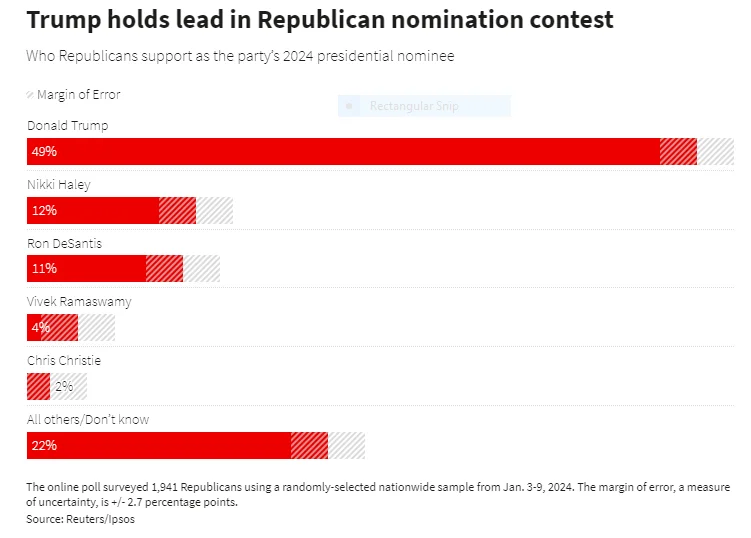
Summary:
Donald Trump maintains a solid 49% lead in the Republican presidential nomination race, outpacing rivals Nikki Haley (12%) and Ron DeSantis (11%), according to a recent Reuters/Ipsos poll.
In a nationwide survey of 1,941 self-identified Republicans conducted from January 3 to January 9, the Reuters/Ipsos poll unveils significant insights into the dynamics of the Republican nomination race. Former President Donald Trump stands out as the preferred candidate, enjoying the support of 49% of respondents.
Despite facing legal challenges, Trump’s popularity remains resilient, holding steady since the summer. During this period, numerous Reuters/Ipsos surveys consistently portrayed Trump capturing roughly half of the Republican electorate’s support. This dominance persists even as his rivals, including Nikki Haley and Ron DeSantis, have struggled to gain substantial traction.
Nikki Haley, the former South Carolina Governor, has seen a boost in financial and media backing from Republicans who resist the idea of a third Trump nomination. However, she finds herself in a virtual tie with Ron DeSantis, the Governor of Florida, who has faced organizational challenges during his campaign.
A notable trend emerges when examining the educational background of Republican respondents. Among those with a college degree, Trump’s support dips to 34%, with 21% favoring Haley. However, among Republicans without a college degree—comprising a substantial portion of the electorate—Haley’s support dwindles to just 8%, according to the poll.
ALSO READ
- Democrats Unveil Historic $35 Million Initiative To Woo Black, Latino, And Asian Voters In Swing States
- German Farmers Bring Traffic To A Standstill In Protest Against Subsidy Cuts
- Trump’s Familiar Tactic: The Evolution Of ‘I’m Rubber. You’re Glue.’ Takes Center Stage

The upcoming state nominating contests, starting with the Iowa caucuses, may provide a clearer picture of the candidates’ standing. While the poll does not definitively predict the outcomes, it underscores Trump’s continued dominance in the Republican field.
It’s worth noting that the random sample of U.S. adults, collected online, carries a margin of error of plus or minus 3 percentage points. As the political landscape evolves, these numbers offer a snapshot of the current sentiments within the Republican party as the race for the nomination unfolds.
